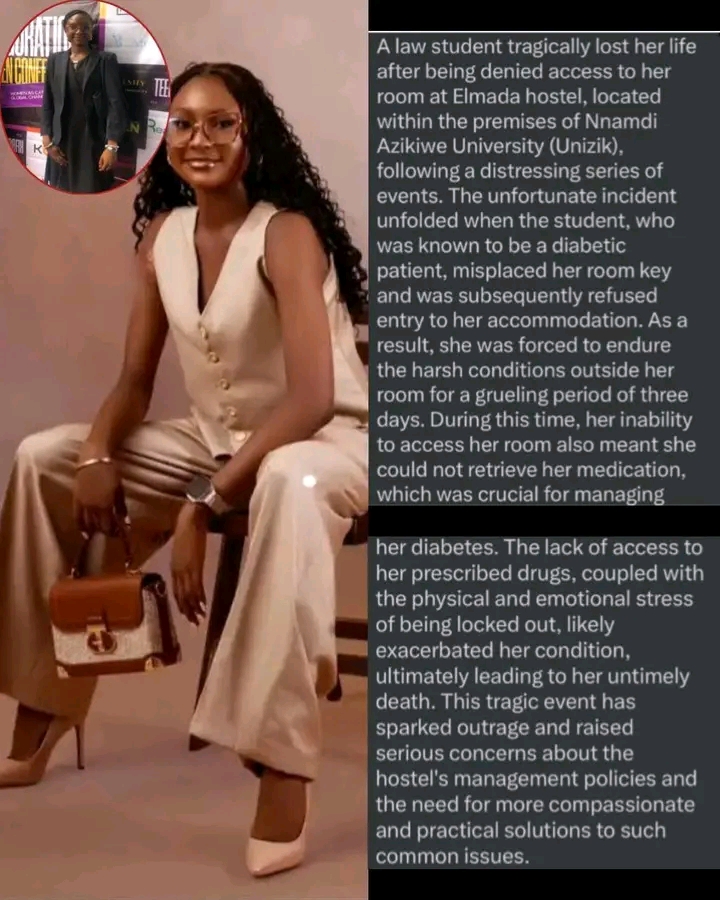Law Student at Nnamdi Azikiwe University Dies After Being Denied Access to Diabetes Medication
Location: Chioma Isabella Ajana, a promising law student at Nnamdi Azikiwe University (UNIZIK) in Awka, Anambra State, has tragically passed away following complications reportedly linked to her inability to access essential diabetes medication.
According to multiple sources within the institution, the young woman lost access to her medication after being locked out of her hostel room. It is alleged that the hostel’s management refused to assist her in retrieving her medication unless she paid a significant fee—reportedly N120,000—for a replacement key or forced entry. This refusal, many claim, contributed to a rapid deterioration in her health condition and ultimately to her untimely passing.
Her death has triggered widespread shock, sorrow, and outrage throughout the university and beyond. Many are pointing fingers at a system they say failed her, demanding that there be accountability and reforms to ensure no other student suffers a similar fate.
A Promising Future Cut Short
Chioma Isabella Ajana was not just another student passing through the university system. She was known among her peers and lecturers as a bright, focused, and determined individual with a passion for justice and a future that many believed would be nothing short of exceptional.
Described by friends as compassionate, humble, and diligent, Chioma had dreams of becoming a leading figure in the Nigerian legal system. She had dedicated herself to her studies and was actively involved in student initiatives, particularly those geared toward legal education, youth empowerment, and social justice.
Tragically, that bright future has been extinguished under deeply distressing circumstances.
The Events Leading to the Tragedy
Sources familiar with the situation recount that Chioma misplaced her room key within her hostel premises. Faced with the need to access her daily dose of diabetes medication—reportedly stored inside her locked room—she sought help from the hostel authorities. According to multiple eyewitness accounts, she approached the hostel mistress for assistance.
Rather than being provided with immediate support, Chioma was allegedly told that she would need to pay N120,000 to gain access to her room using a spare key or by forcefully opening the door. This demand was reportedly made despite her frantic explanation of the life-threatening nature of her condition.
Locked out, vulnerable, and in urgent need of her medication, Chioma’s condition began to worsen. As hours passed without relief or access to what she needed for survival, her blood sugar levels reportedly fell into dangerous territory. Eventually, the situation deteriorated beyond recovery.
She was later confirmed dead after attempts to resuscitate her failed.
Reactions from the Campus Community
The atmosphere on campus has been described as heavy with grief and anger in the wake of the tragedy. Students, faculty, and staff who knew Chioma personally or had merely heard of her brilliance and kind spirit have all expressed sorrow and disbelief over what they view as a preventable loss.
Many students have taken to social media to express their outrage, using hashtags to amplify her story and call attention to the perceived negligence that led to her passing. Protest posters have reportedly appeared in parts of the campus, demanding justice for Chioma and reforms in hostel management practices.
“She did not have to go like this,” said one of her classmates during a candlelight procession organized in her memory. “This was a medical emergency. Anyone with compassion would have acted differently.”
Lecturers who taught Chioma have also shared tributes, recounting her academic excellence, sharp legal mind, and the respect she earned even from senior colleagues. “She was the kind of student who made teaching feel worthwhile,” said one professor. “We have lost a future leader.”
The Role of the Hostel Management Under Scrutiny
The focus of public anger has largely been directed at the hostel’s management, particularly the hostel mistress accused of denying Chioma timely access to her room. While official statements from the hostel administration are yet to be released, the gravity of the allegations has prompted university officials to initiate an internal investigation.
According to several accounts, the hostel has a policy regarding lost keys, but students are now questioning whether such policies are appropriate in situations involving medical emergencies. Many argue that rigid rules should never override the moral and ethical duty to preserve human life.
One student leader commented, “This was not a disciplinary issue. It was a medical crisis. And the system’s response was not just inadequate—it was inhumane.”
A Broader Conversation on Student Welfare
Chioma’s death has also opened up a broader conversation about student welfare, access to healthcare, and the responsibility of school authorities to protect students beyond academics. Students living with chronic illnesses, such as diabetes, epilepsy, asthma, and others, often require special considerations—something many believe is lacking in student housing regulations.
Multiple student associations have since called for a comprehensive review of hostel policies across Nigerian universities. They argue that this is not just about punishing one person but about transforming the environment so that it becomes safer and more supportive for all students.
A group of student union representatives released a joint statement saying, “We are heartbroken, but we are also enraged. We will not allow Chioma’s passing to be in vain. We demand a restructuring of hostel protocols to ensure that no student ever suffers such a fate again.”
Emotional Tributes and Vigils
In the days following her passing, tributes have poured in from across the country. University groups, legal societies, student unions, and concerned citizens have used their platforms to honor Chioma’s memory and express solidarity with her grieving family.
A candlelight vigil was held on campus, drawing hundreds of students and staff who gathered in silence, many in tears, holding lit candles and placards that read messages such as “Justice for Chioma,” “Her Life Mattered,” and “Reform Hostel Policies Now.”
Those who attended the vigil described it as a moment of shared pain and resolve. “It wasn’t just mourning—it was a call to action,” said one attendee. “We all stood there knowing that something has to change.”
Legal and Institutional Response
Though no formal charges have been made public as of this report, pressure is mounting on both the university and law enforcement to thoroughly investigate the matter. Legal experts have weighed in, saying that if negligence or dereliction of duty is established, criminal liability could follow.
The university has issued a brief statement expressing condolences to Chioma’s family and promising a full investigation into the incident. The statement added that appropriate measures would be taken against anyone found culpable.
However, critics argue that words are not enough. Many are calling for transparency and accountability—not just behind closed doors, but in a manner that restores public trust and affirms the value of student lives.
A Life Remembered
Beyond the public outcry and institutional responses, what remains most deeply felt is the loss of a young woman who had dedicated her life to building a future through education and service. Chioma Isabella Ajana leaves behind friends, classmates, and family members who are left to carry the burden of her absence.
For them, her memory is not just a symbol of failed systems, but of a life filled with purpose, intelligence, and heart. Her loss is being mourned not only for what happened but for all the good she would have done, had she been given the chance.
As one fellow student poignantly put it, “We didn’t just lose Chioma. We lost everything she stood for—kindness, justice, excellence. We owe it to her to change the system that failed her.”
Conclusion
The heartbreaking death of Chioma Isabella Ajana at Nnamdi Azikiwe University has left a deep scar on the campus and beyond. Her passing has triggered grief, sparked activism, and opened an urgent dialogue on the importance of empathy, responsibility, and systemic reform.
As investigations continue and the community seeks healing, many are holding on to the hope that her story will lead to meaningful change—not just in policies but in the hearts of those entrusted with the care of others.
Her legacy, it seems, may live on in the changes her memory inspires.
May her soul rest in peace. ️




